THE ROSES OF TAIF
Before leaving my native Mexico for Saudi Arabia, I read an article
about roses being cultivated outdoors in the western part of the
country, in Taif. Although I knew there were a variety of agricultural
projects in that general area, I was still fascinated by the very idea
of Roses in Arabia. In my mind I could not picture flowers being raised
in a harsh and dry climate, at least not as easily as they are in
countries where nature lavishly assists just about anything you want to
grow.
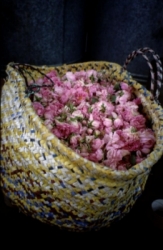 My husband, John,
by then, had gotten a contract to work in Jeddah, which is relatively
close to Taif, and I was eager to join him before April, the main month
of the year when rose buds bloom only at dawn, making it easy to pick
them at precisely the right moment. Their marvelously scented oils are
then transformed into rose water from which attar, a highly appreciated
perfume, is obtained. Yes, I wanted to be a witness to what I
considered to be a magic phenomenon. My husband, John,
by then, had gotten a contract to work in Jeddah, which is relatively
close to Taif, and I was eager to join him before April, the main month
of the year when rose buds bloom only at dawn, making it easy to pick
them at precisely the right moment. Their marvelously scented oils are
then transformed into rose water from which attar, a highly appreciated
perfume, is obtained. Yes, I wanted to be a witness to what I
considered to be a magic phenomenon.
 One afternoon in
the middle of April, my husband, and our two good friends, John and
Maggie Jenkins, drove up the spectacular escarpment which leads to
Taif. The Jenkins knew the caretaker of one of the rose farms, and they
had invited us to come along. We were following the Jenkins in our own
vehicle, a hardy Blazer stuck (by the former owner) with the unlikely
name of Petunia. At the very top of the escarpment, a gang of furry
baboons, including some mothers carrying their babies, looked at us as
if they expected every visitor passing that way to give them a treat.
We couldn't join the people who stopped to feed them or to look at them
because the Jenkins had warned us about the many twisting dirt roads
which we would have to take in order to reach the rose farms. "And
there'll be a few mountains to go over as well", they told us. One afternoon in
the middle of April, my husband, and our two good friends, John and
Maggie Jenkins, drove up the spectacular escarpment which leads to
Taif. The Jenkins knew the caretaker of one of the rose farms, and they
had invited us to come along. We were following the Jenkins in our own
vehicle, a hardy Blazer stuck (by the former owner) with the unlikely
name of Petunia. At the very top of the escarpment, a gang of furry
baboons, including some mothers carrying their babies, looked at us as
if they expected every visitor passing that way to give them a treat.
We couldn't join the people who stopped to feed them or to look at them
because the Jenkins had warned us about the many twisting dirt roads
which we would have to take in order to reach the rose farms. "And
there'll be a few mountains to go over as well", they told us.
"Will we be
needing four-wheel drive, then, John?" we asked, a bit nervously,
because we had been warned that ours wasn't working properly.
"Not to worry,"
replied our friend, "the roads are a bit rough, but if it looks like
you can't make it, we'll just carry on in our vehicle."
They were right
about the rough part. We had just entered the outskirts of Taif when
the Jenkins took a paved road which led up into the mountains and
suddenly ended. Then we started following a dirt road which rose and
fell and curved this way and that. At first, this road was quite nice
and we hoped it would continue like that so we would not even have to
think about four wheel drive. To our dismay, though, the road started
getting really rough and, at some point, we realized we were perched on
top of a high hill from where we could see a town way down below. Yes,
we would have to go down there and cross the town in order to continue.
"Hang on, Petunia!", we cried. Seeing the Jenkins bouncing happily
among all those big rocks with their Jeep didn't encourage us much, and
my stomach developed multiple cramps as the road got even rougher when
we began the steep descent. At this point, there was not a positive
thought in my mind.
Suddenly, the Jenkins stopped to talk to someone who was
driving a pick-up truck which was working its way up the steep slope.
"What!... Are we seeing things?" I asked my husband. But it was true:
it was a simple Toyota pick-up! This, I must say, did give us new
hopes... which were quickly dashed the moment we entered a very narrow
stretch of road along the mountain side. Here we found rocks even
bigger than the ones we had laboriously succeeded in passing. We were
convinced that that a simple pick-up could not have gone down this
road, and much less up it. No way! And we were also convinced it was
time to throw Petunia into four wheel drive, whether it worked or not,
because otherwise we would have to turn around and go back -- a mighty
dangerous proposition on that narrow ribbon of road. We were lucky: The
4WD low gears engaged and suddenly Petunia began to lumber along like a
powerful, unstoppable tank. So, we continued, now far more confidently,
following a road which at times was so narrow that Petunia had to
scrape along the side wall to keep us from plunging to the bottom of
the gully.
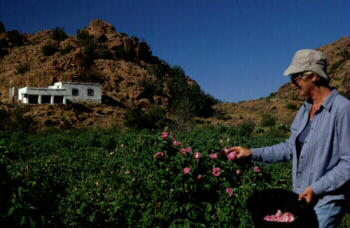 We finally saw
the first rose fields nested among the wadis protected by the
mountains. The dark green bushes were covered with tiny pink buds of
Rosa damascena trigintipetala --known as ward taifi to the locals--
which were waiting to open up the next day, before the sun's rays
diminish the oils which contain the esence of their perfume. A soft
breeze was blowing, filling the atmosphere with the pleasant aroma of
the flowers. This idyllic scene completely changed my state of mind.
From that moment on all I concentrated on was absorbing the beauty
which the rose farms had added to the already magnificent mountain
panorama ever since the rose farming began, three centuries ago. We finally saw
the first rose fields nested among the wadis protected by the
mountains. The dark green bushes were covered with tiny pink buds of
Rosa damascena trigintipetala --known as ward taifi to the locals--
which were waiting to open up the next day, before the sun's rays
diminish the oils which contain the esence of their perfume. A soft
breeze was blowing, filling the atmosphere with the pleasant aroma of
the flowers. This idyllic scene completely changed my state of mind.
From that moment on all I concentrated on was absorbing the beauty
which the rose farms had added to the already magnificent mountain
panorama ever since the rose farming began, three centuries ago.
It was late
afternoon when we arrived. The idea was to camp near the farm we were
visiting and the next morning, at dawn, of course, we would get up to
help the Jenkins' friend to collect the new roses of the day.
The stars were
still sparkling through the dark mantle of night when we started
walking toward the farm. When we arrived at the place where we would
meet the rose farmer, my husband and I looked at each other with
amazement when we noticed that the vehicle parked in the farm was the
very same Toyota pick-up we had seen the day before, and their friend
was the very same driver. "It cannot be possible!... Those pick-up
trucks must be magic!", we cried with chagrin.
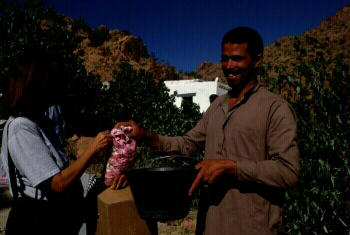 Ali abd al-Hamid
was the name of the farm's caretaker and he was already at work when we
arrived. He was a lively young man with a broad smile and he seemed
delighted to see us. Ali passed out baskets in which we would place all
the roses we could pick before 9:00 AM, when they had to be taken to
the al-Gadhi plant, where we were invited to observe the distillation
process. Ali abd al-Hamid
was the name of the farm's caretaker and he was already at work when we
arrived. He was a lively young man with a broad smile and he seemed
delighted to see us. Ali passed out baskets in which we would place all
the roses we could pick before 9:00 AM, when they had to be taken to
the al-Gadhi plant, where we were invited to observe the distillation
process.
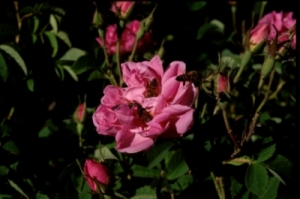 As soon as the
first rays of the sun had touched the roses, the bees began their daily
job of pollination. It was quite a strange feeling to work in
competition with them, going from one rose to another for a very
different purpose. And I must say I felt bad about taking away the
bees' source of food as well as plucking such beautiful and delicate
flowers from what, up to that moment had been their source of life.
However, when I saw a basket full of them and I caught the scent of
their amazing perfume, I could not stop myself from picturing them in
my mind being transformed into rose water and attar --from Arabic 'itr,
"essence" or "perfume"-- which have been used for centuries in so many
countries. And then I had a lovely inspiration: "those roses were
destined to live for many many years and to make many people happy." As soon as the
first rays of the sun had touched the roses, the bees began their daily
job of pollination. It was quite a strange feeling to work in
competition with them, going from one rose to another for a very
different purpose. And I must say I felt bad about taking away the
bees' source of food as well as plucking such beautiful and delicate
flowers from what, up to that moment had been their source of life.
However, when I saw a basket full of them and I caught the scent of
their amazing perfume, I could not stop myself from picturing them in
my mind being transformed into rose water and attar --from Arabic 'itr,
"essence" or "perfume"-- which have been used for centuries in so many
countries. And then I had a lovely inspiration: "those roses were
destined to live for many many years and to make many people happy."
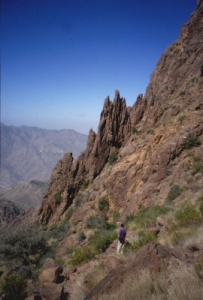 When we had
picked all the buds we could find, we took a short hike to the edge of
the steep, rugged, Harithi escarpment where an ancient camel trail --or
what remains of it-- winds its way down through flowers, bushes and
tall waving grasses to the canyon floor, thousands of feet below. The
magnificent view was framed by towering pinnacles of rock and all we
could do was stare in awe and click our cameras. When we had
picked all the buds we could find, we took a short hike to the edge of
the steep, rugged, Harithi escarpment where an ancient camel trail --or
what remains of it-- winds its way down through flowers, bushes and
tall waving grasses to the canyon floor, thousands of feet below. The
magnificent view was framed by towering pinnacles of rock and all we
could do was stare in awe and click our cameras.
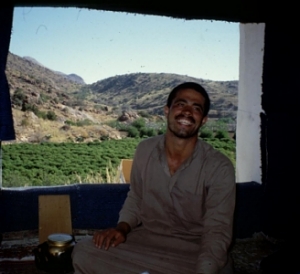 Then we joined
Ali for tea, during which he regaled us with tales of battles fought to
protect his precious roses from porcupines and baboons. Then we joined
Ali for tea, during which he regaled us with tales of battles fought to
protect his precious roses from porcupines and baboons.
The visit to the distillery in Taif was the next
exciting chapter in our adventure. Just inside the entrance of the
factory, there were two people with scales since the quantity of roses
is normally calculated by weight. Inside, several other people were in
charge of carrying out the distillation process. There were several
tin-lined copper pots which can hold about 50 liters of water each.
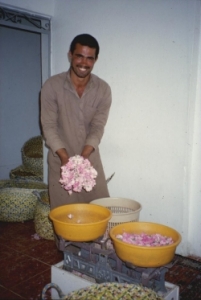
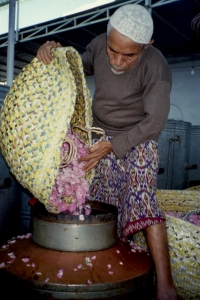 The process of
distillation is, really, very simple. To those 50 liters of water
aproximately 10,000 roses are added. The pot is then tightly sealed
with a cover which looks like a mushroom-shaped hat. This mix simmers
for six hours. The steam collected goes through a tube which passes
down through a pool of cold water and ultimately reaches a large glass
jar called al-Arousa, where the rose water is collected. The process of
distillation is, really, very simple. To those 50 liters of water
aproximately 10,000 roses are added. The pot is then tightly sealed
with a cover which looks like a mushroom-shaped hat. This mix simmers
for six hours. The steam collected goes through a tube which passes
down through a pool of cold water and ultimately reaches a large glass
jar called al-Arousa, where the rose water is collected.
At this point the droplets of attar are still dispersed
in the rose water, so a second distillation takes place, in which the
globules of attar rise to the surface as the liquid cools down,
facilitating their collection with a device similar to a syringe. The
attar collected in just one of these containers produces one single
tolah (about 11.7 ounces) which, understandably, sells for between 2000
and 3000 Saudi riyals.
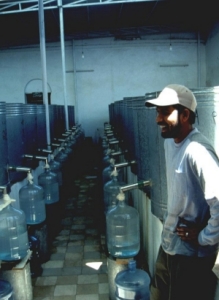
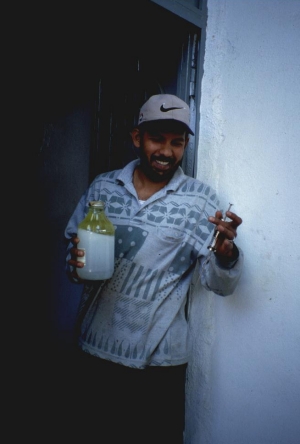 At first, the main purpose for distilling these delicate roses was to
produce rose water which is used at different festivities and
celebrations, like the two "Eid" or at weddings, for example. It's also
used as an ingredient in the kitchen for some dishes and, especially,
for desserts, sweets and some drinks. It is said that it is used as
well to perfume the Yemeni Corner of the holy Ka'bah.
At first, the main purpose for distilling these delicate roses was to
produce rose water which is used at different festivities and
celebrations, like the two "Eid" or at weddings, for example. It's also
used as an ingredient in the kitchen for some dishes and, especially,
for desserts, sweets and some drinks. It is said that it is used as
well to perfume the Yemeni Corner of the holy Ka'bah.
According to a
story, attar was discovered in the 17th century when a woman noticed a
sort of a scum formed on the dishes where hot rose water had been
poured. She collected it little by little, and was amazed as she
realized that that scum had an extremely rich rose perfume. Experts
claim that this scent is so penetrating that it stays in the clothing
where it was applied even after the fabric has been washed for several
times.
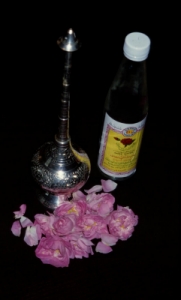 I too can vouch for that.
After coming back from our trip to the rose farm, I chose the best
among the roses which Ali had kindly given us. I put these in a wicker
basket but I couldn't bring myself to throw away the ones which, sad to
say, now looked crumpled, brown and withered, so I tossed them into a
clay bowl. Some days later I happened to need that same bowl, so I put
those dismal-looking remains into another container and I washed the
bowl. Days later, that humble clay pot still retained the
unmistakeable, unforgettable scent of the lovely roses of Taif.
I too can vouch for that.
After coming back from our trip to the rose farm, I chose the best
among the roses which Ali had kindly given us. I put these in a wicker
basket but I couldn't bring myself to throw away the ones which, sad to
say, now looked crumpled, brown and withered, so I tossed them into a
clay bowl. Some days later I happened to need that same bowl, so I put
those dismal-looking remains into another container and I washed the
bowl. Days later, that humble clay pot still retained the
unmistakeable, unforgettable scent of the lovely roses of Taif.
-Susana Pint
|















